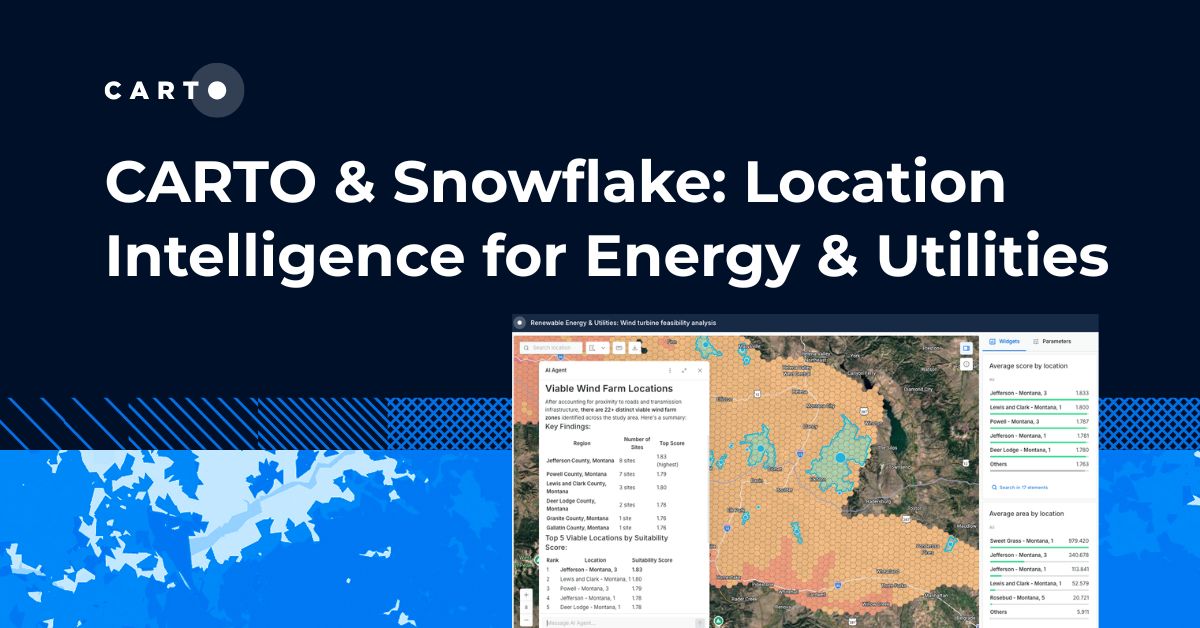Spatial Data Monetization Guide: 3 Tips for Success

Data monetization is a concept that we hear about more every day thanks to the increasing availability and variety of new business intelligence and data science platforms, and the progressive shift toward data-driven decision-making strategies implemented by a growing number of companies. In fact, the data monetization market is booming — as highlighted by Allied Market Research the global data monetization market is projected to reach over $15.4 billion by 2030, a compounded annual growth rate of 22.1% from 2021 to 2030.
The development of data analytics, data science and machine learning technologies are creating an optimal ecosystem for a profitable market for data providers, and more enterprise companies are looking to expand into this area. After all, many companies own highly valuable and monetizable data which is already being used internally — they just need to turn it into a marketable product. However, the data marketplace is not the easiest to move into if the strategy to turn data assets into products is not developed with the needs of final users—and the analytics platforms used to extract value from the data—in mind.
Following years of experience helping industry leading companies with their data monetization strategies, this overview aims to provide a little background and a few best practices we’ve learned along the way at CARTO.
What is Data Monetization and How Do You Monetize Data?
As our world continues to change and become more data-driven, the service of monetizing data has grown exponentially. But what exactly does data monetization mean? In short, it’s the process of earning revenue in exchange for the data assets a company generates and/or collects.
There are two types of data monetization and they work in different ways:
- Internal data monetization - using data internally in Business Intelligence or Advanced Analytics departments to gain greater insights into a company’s own operations or customers.
- External data monetization - selling data to third parties in raw form or as analysis and insights.
Throughout this blog, we’ll be focusing on the latter: external data monetization; and if we’re getting really specific, we’ll primarily be covering the benefits of external spatial Big Data monetization for enterprise organizations and sharing tips on how to begin designing your strategy. As a bonus, we’ll also do a quick overview of how Vodafone, a multinational mobile communications provider, successfully developed their spatial data product using Location Intelligence.
4 External Data Monetization Categories
Before we start, let’s quickly go over the most popular categories for monetizable external data. These are:
- Marketing data: Datasets are typically aggregated or anonymized customer demographic information, web traffic insights and consumer preferences, and this information is typically used for market research and geomarketing activities.
- Behavioral data: Social media sentiment, web browsing habits and mobility patterns.
- Operational data: Data that is created from an exchange of goods or services, transaction records and sensor logs.
- Commercial data: Such as industry developments (M&A, closed businesses, IPOs) and stock prices.
Benefits of Data Monetization
Creating and offering data as a service offers additional advantages to your company as well as consumers such as…
- Improving your competitive advantage.
- Strengthens your understanding of customers so you can improve their experience.
- Assists in finding new areas of growth.
- Gives visibility into areas of improvement for your products and services.
- Helps streamline decision-making and planning as you extract better insights from rich datasets.
Ultimately, data monetization done well enables you to get the most out of your data by generating more revenue for your business and reducing costs; it also helps your customers and partners optimize opportunities from improving spatial analysis by overlaying additional datasets to enhancing targeting for out-of-home advertising campaigns.
Should I Monetize My Data?
When deciding whether to monetize your company’s data, it’s important to start by exploring the current landscape of data products you are looking to commercialize and how they are being used with existing technologies. It’s also pertinent to understand which industries and use cases your data assets can be useful for, and the potential return on investment those customers will obtain with your data.
Once you have identified which of your data assets have the potential to be monetized, the next step is to decide whether giving access to the raw data by itself could be valuable to potential customers. Another option is to create derivative data products, which by leveraging the raw data, in combination with other data sources and running modeling techniques can allow customers to extract more value or reduce their time-to-insight compared to commercializing the raw data as a standalone product.
Want to start monetizing your data? Download the full report
3 Tips for Developing a Spatial Data Monetization Strategy
Building a spatial data product adds an extra degree of complexity, and certain additional considerations need to be taken into account. By definition, it should mean no more than adding a geographical reference to your data, however, this nuance will open up the use of your product to a broader range of geospatial analyses that can be powered by some specific technology platforms. With that, it’s important for you to consider the spatial components of your data product with particular care.
In order to help you develop and launch a solid spatial data monetization strategy, we recommend following these three tips:
Tip #1: Ensure Data Quality
Data quality refers to the ability of a dataset to be successfully used to make data-driven high quality decisions. Data quality depends on several factors, such as precision, accuracy, consistency, coverage and completeness. If you want your data product to provide value to its users and to generate interest in the market, you should assess how it scores against these different factors and benchmark it to similar products in the market.
Tip #2: Choose the Best Delivery Mechanisms
Nowadays, there are many systems that allow you to transfer large amounts of data. In order to choose one or several delivery mechanisms it’s crucial that you understand the technical requirements of your recipients. In the case of CARTO’s Data Observatory for example, it’s pertinent that data pipelines are automated. Because of this, we prefer data to be delivered via cloud storage services that allow retrieval via API. In this particular case, it’s also important for your naming and file paths to be consistent and predictable.
Tip #3: Document Your Data Well
Although not always set as a priority, providing good documentation of your data products is crucial for users to be able to extract value from them.

Looking for best data documentation practices and additional tips (like how to create a licensing model or pricing model) needed to help develop a successful data monetization product? You can find them in our Spatial Data Monetization 101 report which you can download here.
Spatial Data Monetization in Practice: Vodafone’s Story
Vodafone is one of the largest multinational mobile communications providers and offers connectivity for over 625 million mobile customers around the world. They have a B2B division called Vodafone Business that’s helping shape the future of many data-driven organizations by providing, products and solutions designed to leverage big data generated across Vodafone’s mobile networks.
Their Challenge
Vodafone Business was looking to increase its revenue by creating a new B2B telco data monetization solution that could turn their anonymized and aggregated mobile event data collected across their network into spatial insights for a few key sectors. When strategizing exactly how to design and launch this product, they encountered two challenges:They needed to comply with privacy regulationsThey needed an accessible interface that was capable of actually presenting the true value of their mobile insights
Our Location Intelligence technology was able to meet both of these needs and thus the jointly built solution Vodafone Analytics was made.
The Spatial Data Monetization Product: Vodafone Analytics
Vodafone Analytics, Vodafone Business’s Location Intelligence offering provides insights into human mobility patterns that enable better decision-making for the Real Estate, Tourism and Retail industries. These insights are based on mobile network events and they were able to build three solutions for each industry, respectively.
Vodafone Analytics Footfall: Designed for folks in Real Estate, this solution utilizes foot traffic data and is primarily used for site planning and investment analysis.Vodafone Analytics for Retail: Primarily leverages human mobility data in the (you guessed it!) Retail sector to analyze individual store performance and understand site catchment.Vodafone Analytics for Tourism: Provides a Location Intelligence solution that helps professionals in the tourism industry better understand and analyze the behavior of both national and international tourists.
Ready to Start Monetizing Your Spatial Data?
Data monetization is a highly attractive market and can be complementary to your core product and service offerings. It is both an attractive additional revenue stream on its own in terms of margins and also an enhancement through which to seek deeper and stickier relationships with your customers. Those who move quickly, leading the innovation and development in this space and work closely with their customers are likely to lead the way for years to come.
At CARTO, we can help you with your spatial data monetization strategy as we have for market leaders like Vodafone. All you have to do is schedule a demo with one of our Location Intelligence experts to get started.
















.png)

.png)
